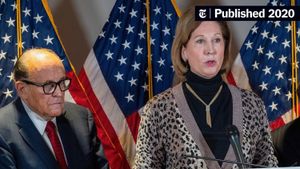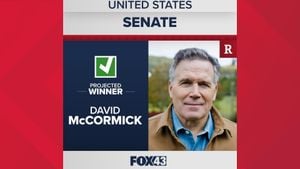South Australia's First Nations Voice to Parliament is facing significant upheaval, marked by the recent resignations of several key members including its leader, Tahlia Wanganeen. These departures have been attributed to concerns over the body’s operational viability and the constraints placed on its members, raising questions about its future effectiveness.
The resignations came only months after the inaugural elections held back in March. The Voice, aimed at amplifying the concerns and perspectives of Indigenous Australians within the political arena, is now under scrutiny following these developments.
Wanganeen, who was elected to the Central Adelaide Voice and appointed as the presiding member of the State Voice, made headlines when she announced her resignation from both roles this past September. She openly described the current model as 'unsustainable,' pointing to the excessive demands placed on the joint presiding members, who also have full-time jobs outside the Voice. “The current model is unsustainable, particularly for the joint presiding members and the activities required to be undertaken,” she said. “It's also true for ... the local Voices because ... everybody has day-to-day jobs to perform.”
Alongside Wanganeen, three other elected members also stepped down: Cheryl Axelby, Darryle Barnes, and Joy Makepeace. Aboriginal Affairs Minister Kyam Maher commented on the situation, indicating the resignations stemmed from various personal reasons, including the need to relocate or take on new employment, which does not offer the necessary flexibility to fulfill duties with the Voice. While some members chose to remain tight-lipped on their reasons for resigning, Maher indicated he respected their privacy, stating, “That’s not necessarily my place, to go to people’s personal details.”
Interestingly, the voice’s secretariat director, Andrea Mason, also submitted her resignation, expressing her intent to return to the Northern Territory for family reasons. Reflecting on her experience, she stated, “I have enjoyed my time supporting members and government to implement the First Nations Voice Act 2023. It has been a privilege serving First Nations people in this role.”
With these resignations, the South Australian Electoral Commission is currently preparing to conduct supplementary elections to fill the vacancies left by the departing members. Maher mentioned, “There will be a supplementary election, I presume sometime in the new year.” Plans are being made to fill the two vacated positions with candidates who were runners-up from the March elections.
The recent turmoil has also prompted concern from within the ranks. Uncle Charles Jackson, an Adnyamathanha elder and senior Australian of the Year, expressed his apprehensions about his future involvement with the Voice. Jackson elaborated on the struggles he faces, noting the existence of barriers limiting his ability to effectively convey the thoughts and needs of his people. He questioned the value of his role when stating, “I just thought... what's the purpose of being a voice for my people?”
His comments have drawn attention to issues of transparency and communication within the Voice. Independent MP Frank Pangallo voiced these concerns publicly, asking Maher why members seem to be restricted from engaging with media about matters relevant to their communities. “Why are members of the state Voice being gagged from speaking to the media about matters impacting their people?” Pangallo challenged.
Despite these issues, Maher maintains there is no systematic effort to silence Voice members. He acknowledged Uncle Charles's pivotal advocacy for his community but insisted he was unaware of any restrictions imposed on speaking out. Maher defended the presence of public sector employees on the Voice, arguing it should not impede their capacity to represent their communities just because their wages are sourced from the government.
“I disagree with the sentiment implying having a career or job in the state or federal public sector ought to preclude you from standing to represent your community,” he stated, emphasizing his conviction on the importance of representation for Indigenous Australians.
The South Australian government had initially aimed to have the Voice deliver its first address to Parliament this year, but with the recent shakeup and the potential for supplementary elections, these plans may face delays. The call for reflection on the model's sustainability points to broader themes affecting Indigenous governance and representation within Australia.
The fluctuated circumstances within the First Nations Voice highlight the challenges faced by Indigenous representation structures, particularly how they navigate between government expectations and grassroots community advocacy. Observers are closely monitoring these developments, wondering how they’ll shape the Voice's future and its relationships with Indigenous communities and the broader governance frameworks.
Above all, the recent resignations mark just the beginning of what appears to be a significant transition phase for South Australia’s First Nations Voice to Parliament, raising important questions about its structure, functionality, and the voices of those it seeks to represent going forward.



